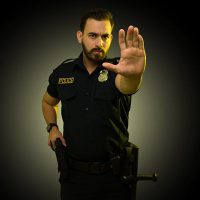When Can The Police Require You To Show ID?

The Fourth Amendment protection against illegal search and seizure of property means that, if you are just minding your own business, the police should just leave you alone. The Fifth Amendment protection against coercing into incriminating oneself means that, if police initiate an interaction with you, whether or not they do it for a legally justifiable reason, you almost always have the right to refuse to answer if you reasonably believe that answering could draw the attention of the criminal justice system or count against you in a current criminal case. Despite these general protections, there are situations where police have the right to a rudimentary exchange of information with anyone present. Specifically, if the police are investigating a suspected crime, they may ask you your name, address, and date of birth, which is to say, the information that appears on driver’s licenses and other photo I.D. cards issued by the state of Florida. If you believe that you were wrongfully arrested or wrongfully charged with a crime after police asked you for identifying information, contact a Tampa criminal defense lawyer.
Showing Your ID at Traffic Stops
If a police officer thinks he or she saw you break a traffic rule, or if your license plate matches one that police have flagged for investigation because a witness reported seeing it at a crime scene, the police can pull you over. Florida law requires all drivers to carry a valid driver’s license whenever they drive, so expect the police to ask to see your license.
Traffic stops can quickly lead to police saying that there is probable cause to search your car, because the definition of probable cause is vague. You have the right to refuse a search. Police may ask passengers their names, but passengers do not have to carry their driver’s licenses; a license is not required to travel by car if you are not driving.
Are the Police Investigating a Crime or Just Being Nosey?
Police can ask you for your identifying information if they are investigating a possible offense, and they can almost always claim that they are investigating. The alleged offense might be something as simple as loitering, which means standing or sitting in a public place where you should not be, or prowling, which means walking in a place where you should not be. It is normal to feel indignant if police tell you that you seem to be up to no good when you are just minding your own business. Remember that you are not required to tell the police more than your identifying information. If you are sitting in front of a 7-Eleven waiting for your cousin to pick you up and drive you home, you do not have to say this. If an officer asks you how you got to your current location or where you are going, you have the right to refuse to answer. The officer might arrest you, but you have the right to due process, and your lawyer might be able to help you get the charges dropped.
Contact Tampa Criminal Defense Attorney Bryant Scriven
A criminal defense lawyer can help you if you are facing criminal charges after an officer arrested you for an apparently insignificant reason. Contact Scriven Law in Tampa, Florida to schedule a consultation.
Source:
msn.com/en-us/news/us/do-you-know-your-rights-17-things-you-don-t-have-to-answer-when-stopped-by-police/ss-AA1wWKhO?ocid=msedgntp&pc=ACTS&cvid=24c2710d5d1840119dfb5346ec154ea6&ei=49#image=9

